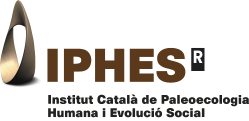NewsNext Previous
A researcher trained at IPHES, Sabrina Bianco, studies the wood supply and consumption from Bàrcino
This is possible thanks to the study of charcoal remains from urban contexts in Barcelona, as el Born
The objective, among others, is to acknowledge the relationship between the city and its environments, the energy supply and its sustainability
She has been awarded with a INPhINIT scholarship from Fundació “la Caixa” that will allow her to continue her doctoral research in this research centre
Producing energy has been a human need that goes back to our ancestors. Thousands of years later, when we study our past, the remaining charcoal that is found in archaeological sites is a treasure that informs us of the used resources, the exploited environment, its uses, applications and sustainability; in this way we also know how the climate and the vegetation was in the past. Anthracology is one of the disciplines at IPHES (Catalan Institute of Human Palaeoecology and Social Evolution), which is still far from being fully developed.
In this context, and in this research centre, Sabrina Bianco is forming, a new specialist in anthracology with the support of the Paleo-Barcino team, a project for the paleoenvironmental and archaeological-biological reconstruction of Barcelona directed by Santiago Riera (SERP- Seminari d’Estudis i Recerques Prehistòriques de la Universitat de Barcelona), in collaboration with Carme Miró i Alaix, head of the Pla Bàrcino from the Servei d’Arqueologia de l’Institut de Cultura de Barcelona at Barcelona (ICUB).
Sabrina Bianco arrived at the IPHES in 2018 through the Erasmus + for Traineeships mobility programme, with the aim of learning the different disciplines involved in archaeobotany. In this research centre, the archaeobotany Unit welcomed her with enthusiasm, since normally the students who join this institution are devoted to disciplines such as zooarchaeology and lithic technology. A person who is interested in archaeobotany at this stage of their career is very rare and, consequently, this case was a peach.
Sabrina Bianco’s first scientific studies have already been included in a master’s thesis on charcoal and wood consumption from the Born site, among other archaeological contexts in Barcelona. The thesis was intended to provide an initial overview of the energy and economic evolution of this city in medieval and modern times, and was defended at the Università degli Studi di Padova (Italy). Recently she has been awarded with a INPhINIT scholarship from the Fundació “la Caixa”, which will enable her to develop her doctoral thesis between the IPHES and the UB’s SERP research group and to deepen and expand her research in the line initiated with the master’s degree.
Archaeobotany is an area of knowledge of archaeology that is often left at the margin of the big debates for various reasons: the poor conservation of the records, the lack of knowledge about plants and our past, or the difficulty of starting to work on a discipline that requires training in botany. Sabrina Bianco already had some knowledge of anthracology, having collaborated with Dr. Sandrine Paradis-Grenouillet (University of Limoges, France) on a project on kilns from the area of Padua and Trentino. From the first moment, she showed her good skills in the process of taxonomic identification, which is difficult. In addition, Sabrina Bianco was very well welcomed by the many master’s and doctoral students who are part of the centre’s critical mass and who have a very enriching experience in terms of scientific debate, knowledge exchange and support in their research careers.
The proposal of the project in the framework of her master’s thesis to study the charcoal of the Mercat de Born, started at the beginning of her stay at IPHES, since it was at that time that Professor Santiago Riera was looking for a person interested in analysing them. He needed someone who was committed to a specific objective and a time plan to obtain results, and Sabrina Bianco seemed to be the ideal candidate.
In fact, during this first stage of the research she has had an excellent work, which has exceeded all expectations. Her work on the Born, together with the study of the written sources, provides a series of taxonomical data that allow us to understand the vegetal communities nearby the city from which they could come. The configuration of the landscape in this region is closely related to the supply of wood and other agricultural and livestock activities.
The master’s thesis was presented in December at the University of Padua, under the co-direction of Professor Alejandra Chavarria Arnau (UniPD, Italy) and Professor Santiago Riera. The results of this research have been published in the European Journal of Postclassical Archaeologies (PCA). The contribution to the study of the energy supply of the city of Barcelona is essential for understanding population dynamics and urban economic activity in relation to the environment in historical periods.
During her stay in Tarragona, Sabrina Bianco has also strengthened her training through participation in parallel activities in dendroanthracology (a discipline that studies the annual tree rings and the diameter of the wood) with Sandrine Paradis-Grenouillet, and the presentation of the preliminary results of the research on the remains of charcoal kilns excavated by the team led by Josep Maria Vergès (IPHES-URV) and Vincenza Forgia (University of Palermo) in Sicily. This work was presented at the 7th International Meeting of Anthracology in Liverpool in September 2019.
Sabrina Bianco will continue her scientific career between the IPHES and SERP-UB through a tripartite co-supervision between Ethel Allué (researcher at the IPHES and associate professor at the URV), Santiago Riera and Llorenç Picornell-Gelabert (UIB-University of the Balearic Islands) as an expert in dendroanthracology. In this way, a long period of collaboration between the IPHES, the UB and the UIB is consolidated through synergies that allow the field of study of archaeobotany and especially anthracology to be extended.


